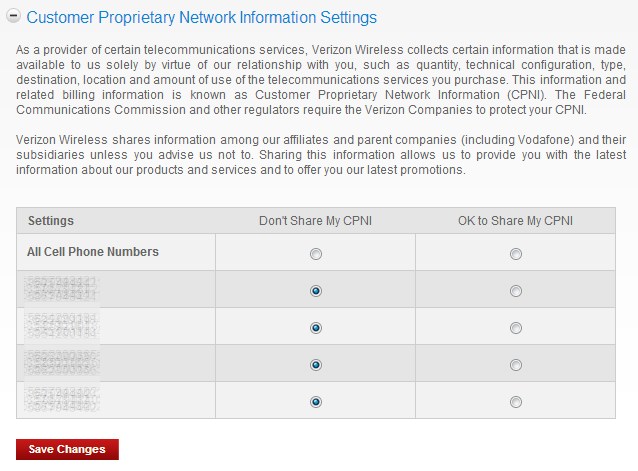 Verizon Wireless is proud of its new “business intelligence” initiative that will collect your browsing habits and online behavior, aggregate it with other customers similar to you, and then package and sell it to anyone willing to pay.
Verizon Wireless is proud of its new “business intelligence” initiative that will collect your browsing habits and online behavior, aggregate it with other customers similar to you, and then package and sell it to anyone willing to pay.
For your convenience, Verizon has automatically opted you in to their Precision initiative, and it is up to you to make the effort to opt out.
“Companies are always seeking opportunities to understand and act on their customers’ preferences, and Verizon is in a unique position to offer information and insight in a format that can help,” said Colson Hillier, vice president, Precision Market Insights, Verizon Wireless. “At the same time, protecting customer data and safeguarding privacy have always been high priorities at Verizon, and we give our customers choice and control over their privacy preferences.”
The first set of services from Precision will help brands and companies such as outdoor media companies, sport venues, and other marketers, to understand the characteristics of the audiences for their products and services so that they can better reach and serve those customers. Business and marketing insights use information from Verizon’s mobile network that is gathered and combined with demographic data, then aggregated to provide real insights into consumer behavior. Data associated with the preparation of business and marketing reports is anonymous and secure and will not allow the identification of an individual.
 Precision plans to introduce additional services including one that will help brands tailor the type of advertising customers see on their mobile phones, also known as relevant mobile advertising, and others that will help marketers create opportunities to better address their consumers and their consumers’ needs.
Precision plans to introduce additional services including one that will help brands tailor the type of advertising customers see on their mobile phones, also known as relevant mobile advertising, and others that will help marketers create opportunities to better address their consumers and their consumers’ needs.
Still, Verizon’s lucrative new program delivers all of the benefits to themselves, while sticking you with an ever-increasing mobile phone bill. If Verizon Wireless wants to collect your browsing data and other “aggregated” information to sell to advertisers, then the company ought to be paying customers to participate. As usual, they keep all of the money for themselves.
Verizon Wireless obfuscates this privacy invasion with technobabble. They call it: Customer Proprietary Network Information (CPNI), ironic for a program that sells “precision” information to Verizon’s clients. In fact, Verizon tracks your location, collects ongoing statistics that can be used to predict where you will be at any given time, and offers that information up to mobile advertisers. They in turn deliver you “relevant advertising,” that eats your limited data allowance. It represents a win-win for the company and advertisers. Sell your data and then collect even more revenue as advertisers pelt you with unwanted ads.
But customers do not have to be the losers. You can deny Verizon their latest Money Party until they share some of the proceeds with you:
- Login to your account at Verizon Wireless.
- Scroll to “I want to…” and find “profile.”
- Choose “Manage privacy settings.”
- Note the section: “Customer Proprietary Network Information”.
- Choose “Don’t Share My CPNI” for each relevant cellular number.
- Make sure to click the “Save Changes” button when finished or your choices will not be saved.
You may want to also block Verizon from cashing in on your data for their Business and Marketing Reports and Relevant Mobile Advertising. Those settings appear just below the CPNI section. Make sure you “Save Changes” for each section.
Not a Verizon Wireless customer? Look out. Your carrier may be packaging and reselling your browsing habits as well.
- Sprint: Collects and markets subscriber data. Login to your Sprint account and select “My Choices” to opt out or call 1-855-596-2397 from each of your mobile devices.
- AT&T: Collects and markets subscriber data. Visit AT&T’s privacy options after logging into your account and opt out as needed.
- T-Mobile: Legalese overload. Would the average customer understand this: “We may obtain your consent in several ways, such as in writing; online, through ‘click-through’ agreements; orally, including through interactive voice response; or when your consent is part of this policy or the terms and conditions pursuant to which we provide you service. Your consent is sometimes implicit.”


 Subscribe
Subscribe
Just received my first commercial ad on my Verizon cell phone